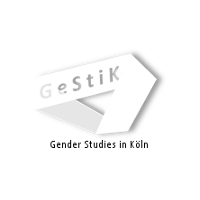Research Profile
Research at the central scientific institution GeStiK (Gender Studies in Cologne) of the University of Cologne defines ‘gender’ as a central processual and structural category and as material-discursive practice. ‘Gender’ is effective in the creation of social order, the production of socio-cultural inequalities, meaning-generating materializations and the production of bodies. ‘Gender’ refers to very different dimensions and contents of meaning, such as symbolic gender orders, institutionalized gender relations, division of labour and modes of subjectivation, identity, sexuality or body constructions/materialization processes, i.e. processes of structuring, differentiation, discipline and hierarchization in the inseparability of materiality and meaning. As critical approaches, gender and queer studies problematize dichotomous confrontations that generate inequalities and exclusions and that prevent the recognition of diverse, mobile differences.
The central academic institution GeStiK pursues two thematic strands in its main research areas: First, the research activities aim to illuminate the entanglements of different dimensions of inequality and discrimination through 'gender', the specific relevance or irrelevance of 'gender' in different social contexts and relations of inequality, i.e. the intersections of gender, sexuality, race, class, dis/ability. Secondly, the research focus 'Materiality and Gender' aims to address these specific patterns of the becoming-relevant of gender not only as linguistic categories, but (beyond the binary of sex/gender, matter/meaning, social/body, cultural/natural, human/non-human) as material-discursive practices and processes of the production of the world, in which non-human actors participate actively.
In epistemological terms, material-discursive construction processes of 'gender' are focused both in everyday interaction contexts and sociotechnical assemblies, as well as on the level of social structures and institutional action. In terms of research ethics, GeStiK views itself as part of a scientific practice that participates in the creation of conditions for an equal, equitable participation of all members of society and a sustainable, ecological world relationship.
- Gender studies, social mobility and social inequalities
The research focus Gender Studies, Social Mobility and Social Inequalities: Intersections of gender, class, ,race', migration and sexuality aims to analyze the entanglements of different dimensions of inequality with 'gender' and the specific relevance-or irrelevance-of 'gender' in social practices and biographical dynamics. - Gender and materiality
Against the backdrop of the Anthropocene and climate change, digitalization and the emergence of artificial intelligence, transdisciplinary problems can currently be observed in the sciences that run counter to the modern division of scientific disciplines into natural and social fields. The current ecological challenges and technological transformations can hardly be adequately grasped with the disciplinary solidified human/technology and human/environment dualisms. Our research focus sees itself as part of these contemporary transdisciplinary efforts to renegotiate the "social" in the face of the complexity of human and non-human entanglements. In particular, the digital penetration of various areas of life, infrastructures and supply systems is associated with far-reaching social transformation processes that increasingly affect the dimension of the gendering of care relationships. In the research focus 'Materiality and Gender', the specific patterns of gender becoming relevant are understood as material-discursive practices and processes of producing the world, in which non-human actors also actively participate. On the one hand, the research focus is thus in the tradition of a queer-feminist critique and deconstruction of naturalized, essentialist notions of sexuality, gender, matter and bodies. At the same time, we take up approaches of a new queerfeminist materialism, which expand the performative dimension of materializations of gender with a posthumanist perspective.
The research focus is currently working on the connection between technology and care relationships in various projects and cross-university research contexts and several projects are in the planning stage.
-
Infrastructures of Gender Studies
In addition to its own research, GeStiK also participates in projects that aim to strengthen and expand the gender studies research network at the University of Cologne and beyond. GeStiK is also involved in the development of teaching formats for Gender Studies.
